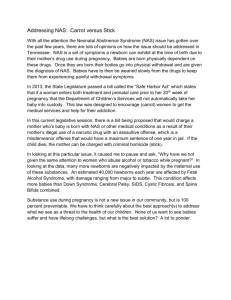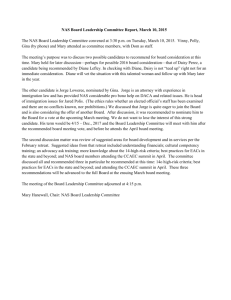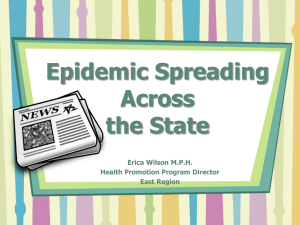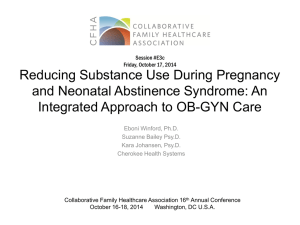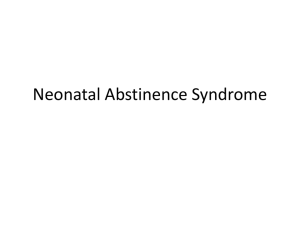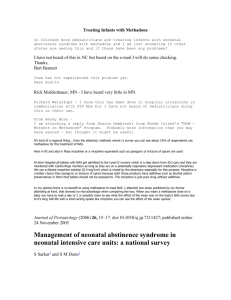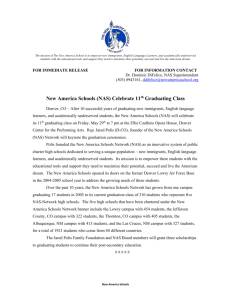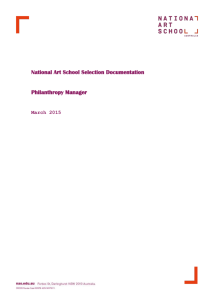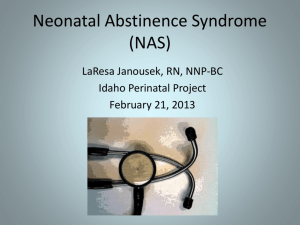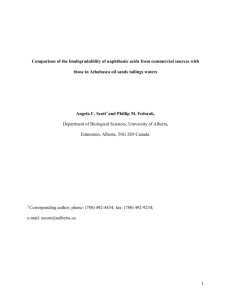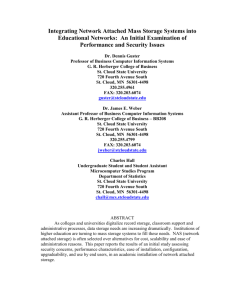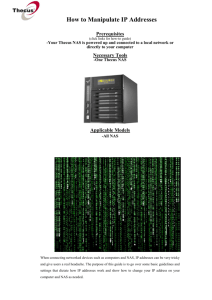Neonatal_Abstinence_Questionnaire_July2015
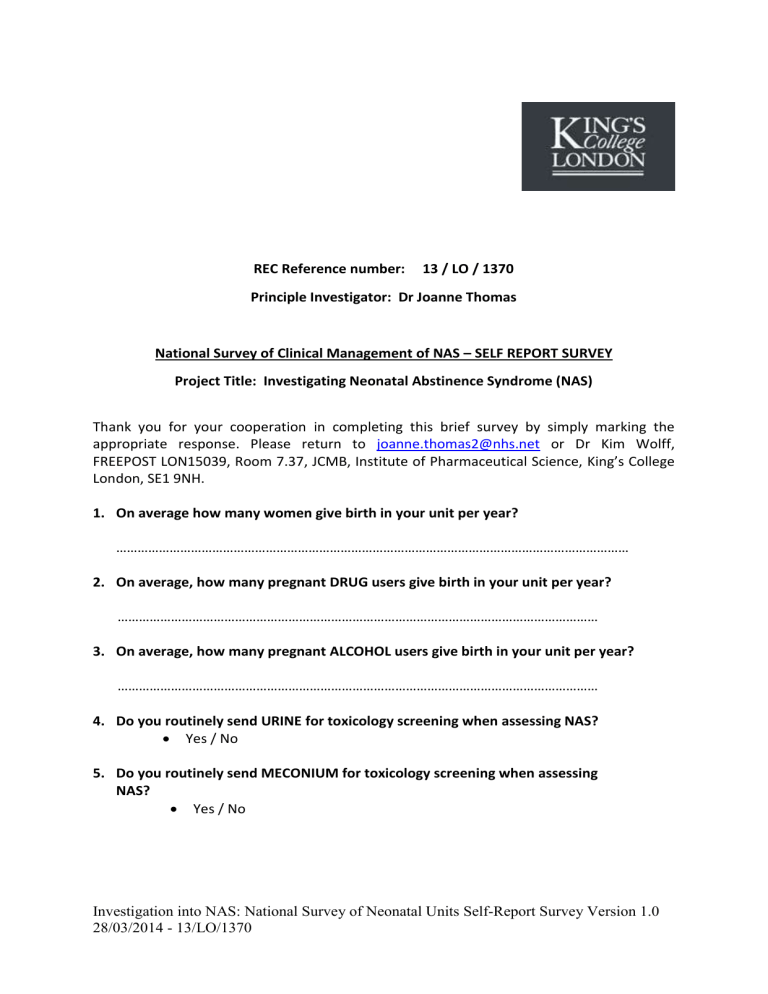
REC Reference number: 13 / LO / 1370
Principle Investigator: Dr Joanne Thomas
National Survey of Clinical Management of NAS – SELF REPORT SURVEY
Project Title: Investigating Neonatal Abstinence Syndrome (NAS)
Thank you for your cooperation in completing this brief survey by simply marking the appropriate response. Please return to joanne.thomas2@nhs.net
or Dr Kim Wolff,
FREEPOST LON15039, Room 7.37, JCMB, Institute of Pharmaceutical Science, King’s College
London, SE1 9NH.
1.
On average how many women give birth in your unit per year?
………………………………………………………………………………………………………………………………
2.
On average, how many pregnant DRUG users give birth in your unit per year?
………………………………………………………………………………………………………………………
3.
On average, how many pregnant ALCOHOL users give birth in your unit per year?
………………………………………………………………………………………………………………………
4.
Do you routinely send URINE for toxicology screening when assessing NAS?
Yes / No
5.
Do you routinely send MECONIUM for toxicology screening when assessing
NAS?
Yes / No
Investigation into NAS: National Survey of Neonatal Units Self-Report Survey Version 1.0
28/03/2014 - 13/LO/1370
6.
When does monitoring for withdrawal symptoms begin? (Please circle)
Within12 hours of birth?
Within 24hours of birth?
When symptoms suggestive of NAS are observed?
7.
Who is responsible for assessing (scoring) the neonate? (tick all that apply)
Doctor – YES/NO Nurse – YES/NO Midwife – YES/NO Other – YES/NO
If other please specify:-
8.
How often is the baby scored? (Please circle)
Once a day: twice daily: four times a day: at specific time intervals (please specify)
9.
If there are compatible signs of withdrawal and a positive history of maternal substance abuse do you routinely send urine for toxicology screening when assessing
NAS?
Yes / No
10.
What drugs does your laboratory routinely screen for when assessing neonates?
(Circle all that apply)
1.
Benzodiazepines – Yes / No
2.
Benzodiazepines differentiated – Yes / No
3.
Cannabis – Yes / No
4.
Alcohol – Yes / No
5.
Alcohol quantified – Yes / No
6.
Morphine – Yes / No
7.
Methadone – Yes / No
8.
Methadone metabolite (EDDP) – Yes / No
9.
Cocaine or Crack – Yes / No
10.
Cocaine/ Crack metabolite – Yes / No
11.
6–MAM – Yes / No
12.
GHB – Yes / No
13.
Ecstasy – Yes / No
14.
LSD – Yes / No
15.
Amphetamine – Yes / No
16.
Don’t routinely screen
Investigation into NAS: National Survey of Neonatal Units Self-Report Survey Version 1.0
28/03/2014 - 13/LO/1370
11.
Do you use a scoring system to assess the severity of withdrawal symptoms?
YES / NO / UNSURE
If YES – please indicate if the tool is listed below
Finnegan – original version
Finnegan – modified version
Lipsitz tool
Zahorodny withdrawal inventor
Rivers scoring system
Green’s narcotic withdrawal index
Others – please give details including amended versions.
12.
Do you use a scoring system to decide when to start treatment?
Yes / No / Unsure
13.
Do you use the scoring system to decide dosage alterations of the drug treatment for
NAS signs?
Yes / No / Unsure
14.
Do you use the scoring system to decide when to terminate drug treatment for NAS?
Yes / No / Unsure
15.
What drug do you use as a first line of management for Opioid withdrawal? Circle all that apply.
Tincture of Opium
Oral Morphine sulphate solution
Methadone
16.
What drug do you use as a second line of management or add for Opioid withdrawal?
Tick all that apply.
Phenobarbital
Diazepam
Clonidine
Chlorpromazine
Chloral hydrate
Other – please state
Investigation into NAS: National Survey of Neonatal Units Self-Report Survey Version 1.0
28/03/2014 - 13/LO/1370
17.
Do you treat poly-drug exposure in utero with medication? (This is defined as the simultaneous or concurrent use of more than one drug including alcohol)
YES/NO
18.
If ‘YES’ do the medications that you use differ from the list in Q 16/17? YES/NO
19.
If ‘YES’ please list medication used instead of those listed in Q16/ 17.
………………………………………………………………………………………………………………………………
20.
Does your service include a specialist/drug liaison midwife for pregnant opioid/drug users? YES/NO
21.
Does your service have links with a specialist drug/alcohol treatment service?
YES/NO/Unsure
22.
Does your service have any form of multi-disciplinary care planning meeting for pregnant women receiving opioid substitution treatment prior to delivery?
YES/NO/Unsure
23.
Do you have a policy/guidelines on your unit for babies born to mothers who use drugs or whom receive opioid treatment for drug dependency? YES/NO
24.
Do you have a written policy for the management of neonatal abstinence syndrome
(NAS) in your unit? YES/NO
25.
Does your unit encourage mothers to breastfeed neonates diagnosed with NAS?
YES/NO
26.
Do you record an ICD-10 diagnosis on discharge summaries for an infant who has displayed symptoms of NAS whether or not treatment was required?
YES/NO
If ‘YES’ – please give details of the diagnostic code.
27.
Please define your clinical role and any area of sub-clinical special interest.
……………………………………………………………………………………………………………………………
If you need any further information, please contact either:
Dr Joanne Thomas - Research student: email joanne.thomas2@nhs.net
Dr Kim Wolff – Project Supervisor: 020 7848 3703 (Office hours only)
Address: Room 7.37, JCMB, Institute of Pharmaceutical Science, King’s College London, London SW1 9NH.
Investigation into NAS: National Survey of Neonatal Units Self-Report Survey Version 1.0
28/03/2014 - 13/LO/1370
Investigation into NAS: National Survey of Neonatal Units Self-Report Survey Version 1.0
28/03/2014 - 13/LO/1370
